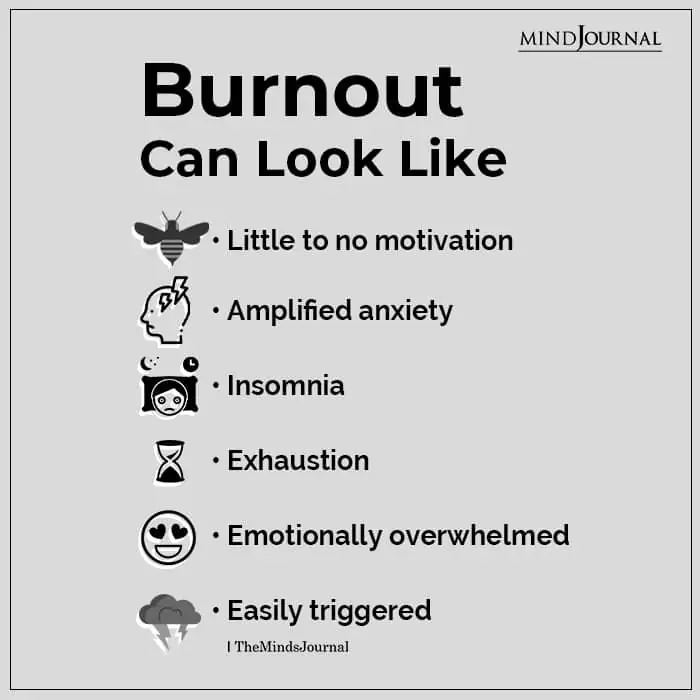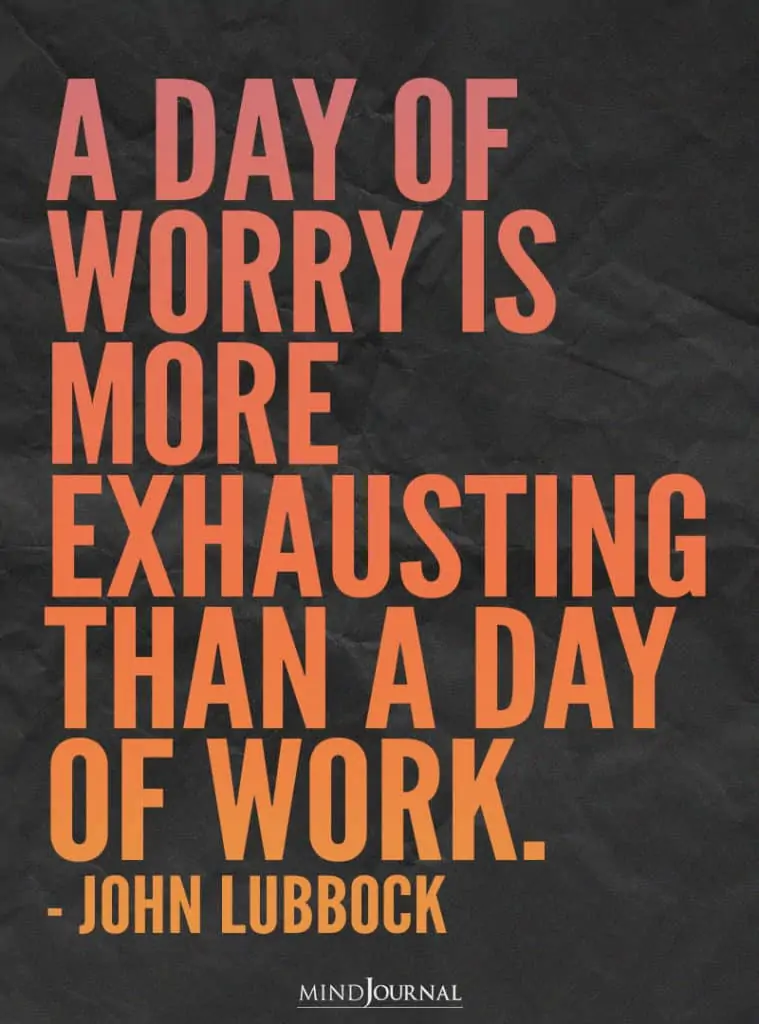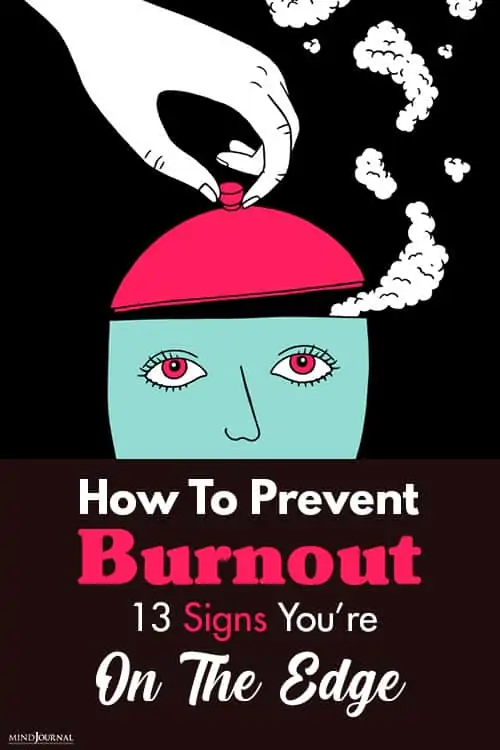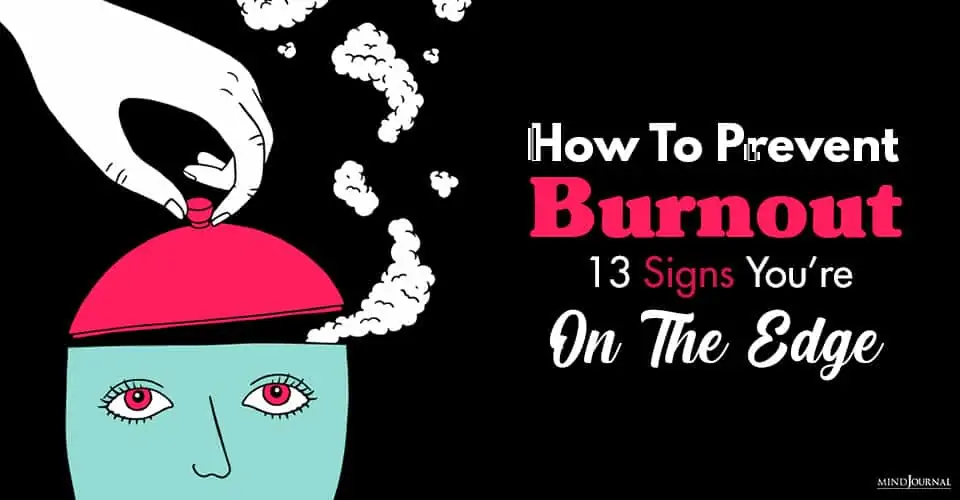Burnout is defined as physical or mental collapse caused by overwork or stress. As it turns out, there are ways to identify the early warning signs of burnout. And, there are many simple practices you can put in place immediately to prevent burnout from becoming an occupational hazard.

Here are 13 Early Signs of Burnout:
1. High levels of stress or anxiety.
Feeling frequently on edge, with adrenaline constantly coursing through your body. (Try this (free) 30 Day Meditation Challenge to feel more calm and peace in just 5 minutes a day)
Related: The Photos You Choose Will Tell How Stressed You Are: Quiz
2. Lack of engagement.
You don’t feel motivated at work. You have difficulty focusing or exhibit a short attention span.
3. Increased cynicism.
Feelings of resentment or disconnection. You may notice yourself being more negative and cynical. Feeling cranky and defensive or snapping at people easily. You don’t make time to talk on the phone or connect with the people who matter most to you. If you’re feeling a lot of resentment towards others, chances are it’s because you’re not getting your needs met and you’re on the path to burnout.
4. Distracted eating.
You eat your meals in front of a computer, television or while on the go (in the car, standing up, etc.)
5. Not getting enough sleep.
The suggested minimum amount of sleep is seven to eight hours each night, if you’re getting less than this, you risk some level of burnout. (Set yourself up for Sleep Success. Turn off all devices at least an hour before bed. I highly recommend earplugs, an eye mask, a white noise machine, and this Deep Sleep meditation + visualization to help you fall asleep easily and stay asleep all night.)
Also read What Is Emotional Burnout And Ways To Replenish Your Energy
6. Low energy and exhaustion.
You’re tired. Not just sleepy tired, but emotionally fatigued. You may feel exhausted by the end of the day, with no energy left to exercise or even engage with others, you just want to crash and watch television or zone out in some other way.
7. Never enough time.
You feel as though you’re always in a hurry and never have enough time for all the things you’re trying to accomplish each day.
8. Excessive worrying, high level of self-criticism.

Your mind cycles through the same worry-filled thoughts again and again and you can’t seem to stop. The critical voice in your head is very loud, telling you constantly to do more, work harder, and no matter what you accomplish, you’re still not doing enough. There is no self-compassionate voice to balance out the critical voice, or if there is, it is very weak and you can barely hear it.
9. Physical illness.
Initially,the physical symptoms can be subtle. You may experience headaches, a persistent cold, have a stomach bug or an upset stomach frequently, or a weak immune system in general. If early signs are ignored, your body may hit a wall and receive a more serious diagnosis.
10. Numb feelings.
Increase in addictive behavior. Initially, this can show up as an excessive dependence on caffeine and/or sugar to stay alert and boost energy when feeling low. As things progress, increased dependence on drugs, alcohol, eating comfort foods or watching more television than usual can be signs you’re burning out and using these coping mechanisms to avoid acknowledging how you really feel.
Also read 5 Signs You Are Experiencing Workplace Burnout
11. Inefficacy.
Experiencing diminished personal accomplishment, a perceived decline in competence or productivity, and expending energy at work without seeing any results.
12. No Breaks.
– Vacation. You can’t remember the last time you took a single day off just to relax and do nothing. Or perhaps you haven’t had a vacation in over six or even twelve months.
– Recharge throughout the day. You may have a tendency to push through your work without taking a break. It’s one thing to be in the zone, but if you notice you’re not getting up to get a glass of water, stretch your legs, go on a walk or call a friend at least once every 90-120 minutes, you could be putting unnecessary stress on your body.
– Weekly Rituals. You haven’t made time for a rejuvenating activity in the last week (massage or any pampering treatment, a bath, cooking or reading a book simply for pleasure, going on a hike, etc.).
13. Not enough exercise.
You aren’t making as much time to exercise or move your body as you would like.
These are 13 signs of burnout.
Now what?
What are some practical, simple & cost free anti burnout things to do?
First, go through the list above and circle your top three symptoms.
Next, ask yourself “Hmmm, what do I need? What will most support me?” for each of these areas.
For example, if you’re eating at your desk five days a week, what you need could be to connect with friends or colleagues over lunch more often, or to exercise during your lunch break. If you haven’t taken a vacation in over a year, what you need could be to schedule a vacation.
Also read Burnout Prevention and Treatment Strategies How To Deal with Overwhelming Stress
Once you determine what you need, come up with an action step for each of these three areas.
An action step has a clear “What” and a “By When.” For example, Action Step: I will plan a vacation and book the tickets by next Thursday at 4pm.
Let us know in the comments below – what are your top symptoms of burnout? And what action(s) will you take to mitigate these symptoms?! Be sure to leave a comment below and let us know!
Setting concrete goals is one of the best ways to ensure you’ll make a change.
Avoiding burnout starts by putting some of these preventative measures in place.
If you want even more accountability, you can recruit an anti-burnout partner.
Tell this person what your action steps are and ask him or her to hold you accountable by checking in to make sure you’ve followed through. Getting support and setting clear action steps will help you implement these simple practices with greater ease.
Written by: Vanessa Loder Originally appeared on: Vanessaloder.com Republished with permission.









Leave a Reply
You must be logged in to post a comment.